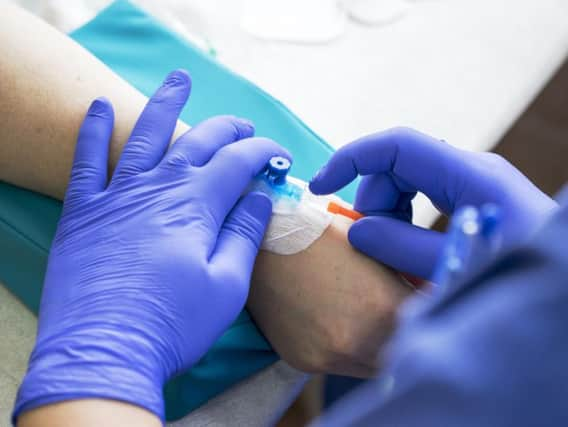Chemo scandal at Scottish health board prescribing lower doses to breast cancer patients


The medics have argued that the full 100mg/m2 dose of docetaxel is “unacceptably toxic”, and a three-quarter dose reduces side effects.
But opponents have seized on the revelation that a full dose costs £23.76 and the lower dose is just £3 less.
Advertisement
Hide AdAdvertisement
Hide AdLee Dennis, who founded the NHS Tayside Cancer Care Support Group said: “Is that the price of a life? £3 is the price of getting rid of cancer, potentially permanently or not permanently. Are they for real?”
Last month a leaked letter from Dr David Dunlop, the Scottish Government’s senior medical officer for oncology, suggested that lower chemo doses almost certainly did NOT affect the survival chances of breast cancer patients.
Oncologists were rapped by watchdogs earlier this year for cutting patients’ dosages without their knowledge.
An investigation by a government watchdog found local medics had clashed with counterparts from across the north of Scotland over the strength of docetaxel.
The drug is used to reduce the risk of breast cancer recurring, but can cause side-effects such as diminished blood counts.
Tayside docs chose to administer the drug at a 75mg/m2 dose, against recommended practice, believing it to be as effective as a full 100mg/m2 dose without unpleasant side effects.
However, they sought to cover this up in published care guidelines – and didn’t tell patients they were getting a weaker dose.
Figures obtained by the Tele show a 75mg/m2 dosage of
docetaxel cost £20.76 per dose.
Administering the full-strength 100mg/m2 dose, in line with best practice across the north of Scotland, would have cost just £3 more – £23.76 each time.
Advertisement
Hide AdAdvertisement
Hide AdAfter Healthcare Improvement Scotland (HIS) published its report into Tayside in April, the health board vowed to give all patients full-strength doses.
However, letters seen by the Tele suggest oncologists are still pushing weakened regimes – against patients’ wishes.
This is despite medical director Professor Peter Stonebridge’s pledge that patients would get “the same regimes as in the rest of Scotland”.
One woman in her 70s sought a second opinion after consultations at Perth and Ninewells.
The patient said she wanted to try the full-strength regime to give herself the best chance of long-term survival.
However, she claims it was “dictated” to her she would only get the lower dose because of her age.
She only learned details of her situation after requesting copies of the letters sent by a cancer consultant to her GP.
The letter reads: “Given her age, her doses will be capped at 80mg/m2.
Advertisement
Hide AdAdvertisement
Hide Ad“This is important given the recent publication by HIS . . . on the basis of which we have been mandated to offer patients these drugs at 100mg/m2.
“Given her age however, published evidence would suggest that it’s far safer to treat her at the former doses and she is accepting of this today.”
The woman denies this and claims the decision was not justified to her.
She has since started another treatment in Edinburgh at full strength.
She said: “I was expecting to get the standard dose. I was told reduced doses were ‘offered’ but I thought that was as far as it went.
“I said I wanted it to be successful and to try taking the full rate to see if I could tolerate it. I appreciate it’s a toxic chemical and there would be side effects but I wanted to try it. The consultant said no.
“It’s a recommended dose for a reason. I feel it’s very dangerous to offer reduced rates.”
Last month, an independent
advisory group convened by the Scottish Government issued 19 recommendations to re-establish public confidence in cancer care at NHS Tayside.
Among its recommendations is an “explicit” need to inform patients whenever they are being offered treatment that varies from nationally accepted norms.